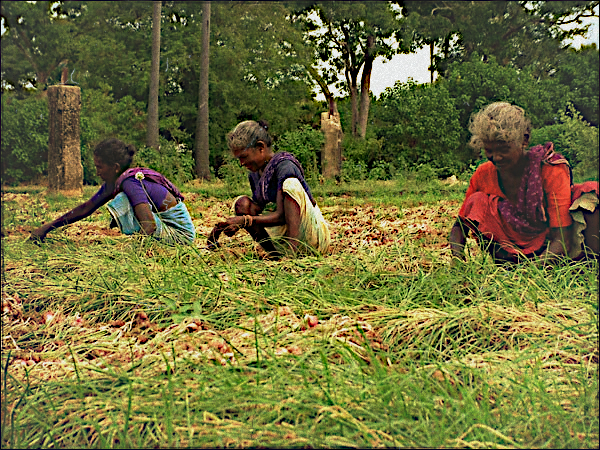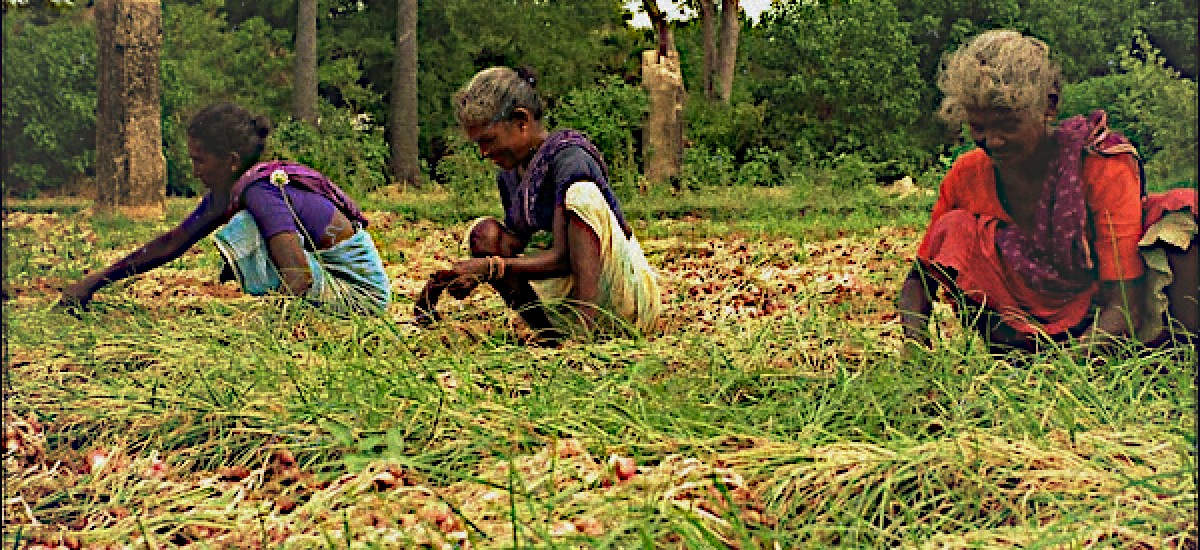
Original photo from asianews.it
Farming in a sustainable, productive manner has been a hallmark of every human tradition that has endured history. There are many traditional farms existent today that have been productive for hundreds of years. Agrarian societies with long histories, posses the credibility of having sustained themselves successfully under the rigor of survival in a natural world. Having no access to fossil fuel driven technologies, they relied on renewable agriculture based upon energy sources internal to that society or region. Expansion of farming was constrained by the environment and ecosystem of each area. The advent of fossil fuel changed all this. The gasoline to power tractors, the biocides and fertilizer salts produced by fossil oil enabled agricultural productivity to transcend environmental constraints.
It was not that movement to fossil fuel went unquestioned, when a display of the new ‘ agricultural tractor’ was done in Sri Lanka around 1933. A race was set up between the traditional buffalo drawn plough and the tractor. Of course the tractor won. When asked what the prime minister, the hon. D.S.Senanayake, thought about this machine. He walked around it with great interest and asked the director of the company “ This is truly a wondrous machine sir, but tell me, where is the dung?” He saw, at that time, the Achilles heel of modern agriculture.
The availability of cheap, subsidized energy encouraged increases in productivity. Agriculture began to be seen as effective production oriented breeding programs coupled with seed and input delivery packages. Genotypes with optimum performance characteristics for high external input agriculture became the standard for agricultural development. However, the bioaccumulative nature of these inputs were not considered and resulted in many cases of food and environmental contamination. The first public alarms on the nature of there chemicals, were sounded in the 1960’s with the publication of books such as ‘Silent Spring’. People suddenly became conscious of the effect that the ‘new’ agriculture was having on biodiversity and health, workers became aware of the tremendous risk to human health posed by these new chemicals. It was very much this concern that saw the emergence of ‘organic agriculture’ as a system for the production of clean, safe, healthy food.
Organic Farming, arose from this need, ‘to produce clean food and sustain a healthy environment’. Organic farming, seeks to re-establish the balance that was maintained between farmers and the land for centuries.
In contrast to the observations of decreasing biodiversity and sustainability in monoculture situations, the pattern of increasing ecological stability with increasing diversity in land use is corroborated by studies of traditional land managers, whose management systems are sustainable and conserve a much higher level of biodiversity than conventional responses. High levels of diversity in the agricultural field produce positive effects of biological control, spread the risk in marketing and production, as well as distributing labor needs to fit with a single family unit.
The traditional Sri Lankan agroecosystems provided ideal models. Operating in a sustainable manner for millennia they became co-evolved units, supporting and developing the biodiversity element of the natural landscape, to confer sustainability to the production system. Further, the traditional knowledge of rice production encompassed the whole landscape, its impact felt at the Tank (reservoir), the rice field and its supporting elements. The value and utility of the traditional knowledge base within the Sri Lankan farming community was also well expressed by the farmers themselves, for example Mr. Mudianse Tennekoon of Nikaweratiya. A traditional rice farmer, he was quick to grasp scientific ideas and could relate them to traditional practices. Although he traveled widely and discoursing modern concepts, he was not a ‘scientist’ and his views were ignored.
Further, In a statement to a national meeting of Sri Lankan farmers, supported by the CGIAR and presented for the Mid Term Meeting of the CGIAR to be held in Brasilia in May 1998. Over 300 delegates issued the following statement:
“We, the farmers of Sri Lanka would like to further thank the CGIAR, for taking an interest in us. We believe that we speak for all of our brothers and sisters the world over when we identify ourselves as a community who are integrally tied to the success of ensuring global food security. In fact it is our community who have contributed to the possibility of food security in every country since mankind evolved from a hunter-gather existence. We have watched for many years, as the progression of experts, scientists and development agents passed through our communities with some or another facet of the modern scientific world. We confess that at the start we were unsophisticated in matters of the outside world and welcomed this input. We followed advice and we planted as we were instructed. The result was a loss of the varieties of seeds that we carried with us through history, often spanning three or more millennia. The result was the complete dependence of high input crops that robbed us of crop independence. In addition we farmers producers of food, respected for our ability to feed populations, were turned into the poisoners of land and living things, including fellow human beings. The result in Sri Lanka is that we suffer from social and cultural dislocation and suffer the highest pesticide related death toll on the planet. Was this the legacy that you the agricultural scientists wanted to bring to us? We think not. We think that you had good motives and intentions, but left things in the hands of narrowly educated, insensitive people.”
In this context, it is sobering to reflect on a favorite quote of the Hon D.S.Senanayake:
“ Agriculture is not merely a way of making money by raising crops; it is not merely an industry or a business; it is essentially a public function or service performed by private individuals for the care and use of the land in the national interest: and the farmers in the course of securing a living and a private profit are custodians of the basis of national life. Agriculture is therefore affected with a clear and unquestionable public interest ….”
However, the goals of modern agriculture discount this public function, based on the premise that the main goal of agriculture is productivity increase, has created a plethora of problems that bedevil all of humanity. The most significant of which are, a loss of sustainability, a loss of biodiversity, a loss of independence, a loss of traditional knowledge and a loss in nutrient breadth. We need a new paradigm in agriculture.
The current developments in agriculture in Sri Lanka run completely contrary to the vision of our founding fathers, contrary to the farmers voice and contrary to scientific knowledge of the impact of agrotoxins on our population. Driven by greed for profits, public interest has been forgotten. In a rejection of the needs of humanity, poisons are sold as agricultural panaceas. In the rejection of a need to become self-sufficient we are being made ever more dependent on external inputs, in a rejection of national needs huge tracts of native forest and handed over to persons and corporations, to be raped and poisioned. The future looks bleak.
Much of the traditional rice agroecosystem has disappeared to pave way for new varieties and management measures. The quantity of toxins sprayed into the environment began to increase and the component of fossil energy in our agricultural production continues to rise. The grim reality of fossil energy based agricultural production is that the price of energy will continue to rise. In order to respond, agricultural productivity should be planned for transitioning towards optimal production with little or no external inputs. Organic Agriculture, Traditional Agriculture and Ecological Agriculture are all approaches to agriculture that have lowered the need for external energy and will benefit the farming community as well as the consumer. A well-planned national program can contribute greatly to a move towards agricultural sustainability.
It is in the context of such a history, that we must address the need to change the current suicidal trend of agriculture in Sri Lanka: As a component of a new paradigm of agricultural development. There are four critical and fundamentally important goals
- Reduce the reliance of external inputs to maintain agricultural productivity
- Increase crop value through better market access
- Increase the biodiversity of agroecosystems
- Reduce the threat of non-communicable diseases for the population of Sri Lanka (est. 74% adults in 2011).
If future agriculture aspires to such goals, it is possible to contribute effectively towards sustainable development. All investment in agriculture should be required adhere to or respect these goals. This will facilitate the manifestation of a national vision.
A vision is not a set of economic policies that assist in the growth of the global economic system nor should it be an excuse for business or politics to increase their capital. A vision is something that can be shared not only among us but also with the future, a future that can judge the realization of the vision with each passing day.
A land where the rivers flow clean.
A land where its citizens can breathe the air without being poisoned
A land where food security is the cornerstone of development
A land where the wellbeing of the poorest is a national priority
A land where health, education and mobility are vital indicators of progress.
A land where parents are given the opportunity of raising their children without fear.
A land where the values of its people and their traditions are recognized and defended
A land where local business is not penalized in order to attract foreign capital.
A land where ethnic or religious differences do not constitute a barrier to national progress and nor create social tensions
However, national goals such as these are not time bound. An individual acceptance of the need of such goals are the only thing required, the process to achieve it may take its time depending on how fast these goals achieve public acceptance.
Farming in Sri Lanka is at a crossroads, do we see it merely an industry or a business or is it an essential public function? If it is also a public function, it must work with the component biodiversity of farms to further the aims of providing humanity with clean, healthy food while at the same time contributing to the goals set out in international conventions such as the CBD, CSD and Kyoto protocol. The standards set for the management of on farm biodiversity must resist the degradation of farm landscapes into broadacre monocultures by maintaining diverse, mixed, production systems, which also provides answers for the current crises brought about by climate change.

